Food for thoughts
Thesaurus : Doctrine
Référence complète : Jeanneney, J.-N., XIXième siècle : la haine, un ressort puissant, émission "Concordance des temps", France Culture, 29 mai 2021.
L'émission est bâtie sur cet ouvrage :
Présentation du thème par Jean-Noël Jeanneney :
"Les messages de haine qui sont charriés sur les réseaux sociaux doivent-ils être censurés par les responsables de ceux-ci ? Et peuvent-ils l’être ? Une loi récente, portée au Parlement par Laetitia Avia, députée de Paris, le leur imposait, sous peine de lourdes amendes. Et même si ce texte a été censuré, pour une large part, par le Conseil constitutionnel, il témoigne d’une inquiétude qui est aujourd’hui répandue.
Il s’agit de la découverte que l’intensité des haines en circulation sur la Toile, qui figent le dialogue démocratique et qui exaspèrent les passions les plus sinistres et les plus délétères, constituent une grave menace pour la prédominance de la raison sur la passion, pour la sérénité des citoyens et pour la cohésion nationale.
Je ne songe certes pas à minimiser ce souci, qui peut devenir taraudant, mais seulement, pour resituer les choses, à rappeler la violence des imprécations que nos ancêtres ont déjà échangées entre eux, dans tout le champ de la politique, de la société et même de la vie familiale. Leur support a changé, mais leurs ressorts et leurs débordements probablement pas. ".
Thesaurus : Doctrine
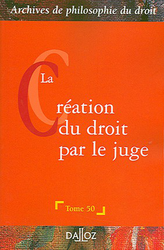
Complete reference : Archives de Philosophie du Droit (APD), La création du droit par le juge, tome 50, Dalloz, 2007, 471 p.
Read the summaries of the articles in english.
See the presentation of other volumes of Archives de Philosophie du Droit.
Thesaurus : Doctrine

► Full Reference: R. Sève, "Compliance Obligation and changes in Sovereignty and Citizenship", in M.-A. Frison-Roche (ed.), Compliance Obligation, Journal of Regulation & Compliance (JoRC) and Bruylant, "Compliance & Regulation" Serie, to be published
____
📘read a general presentation of the book, Compliance Obligation, in which this article is published
____
► Summary of the article (done by the Journal of Regulation & Compliance - JoRC):
The contribution describes "les changements de philosophie du droit que la notion de compliance peut impliquer par rapport à la représentation moderne de l’Etat assurant l’effectivité des lois issues de la volonté générale, dans le respect des libertés fondamentales qui constituent l’essence du sujet de droit." ("the changes in legal philosophy that the notion of Compliance may imply in relation to the modern representation of the State ensuring the effectiveness of laws resulting from the general will, while respecting the fundamental freedoms that constitute the essence of the subject of law").
The contributor believes that the definition of Compliance is due to authors who « jouer un rôle d’éclairage et de structuration d’un vaste ensemble d’idées et de phénomènes précédemment envisagés de manière disjointe. Pour ce qui nous occupe, c’est sûrement le cas de la théorie de la compliance, développée en France par Marie-Anne Frison-Roche dans la lignée de grands économistes (Jean-Jacques Laffont, Jean Tirole) et dont la première forme résidait dans les travaux bien connus de la Professeure sur le droit de la régulation. » ( "play a role in illuminating and structuring a vast set of ideas and phenomena previously considered in a disjointed manner. For our purposes, this is certainly the case with the theory of Compliance, developed in France by Marie-Anne Frison-Roche in the tradition of great economists (Jean-Jacques Laffont, Jean Tirole) and whose first form was in her well-known work on Regulatory Law").
Drawing on the Principles of the Law of the American Law Institute, which considers compliance to be a "set of rules, principles, controls, authorities, offices and practices designed to ensure that an organisation conforms to external and internal norms", he stresses that Compliance thus appears to be a neutral mechanism aimed at efficiency through a move towards Ex Ante. But he stresses that the novelty lies in the fact that it is aimed 'only' at future events, by 'refounding' and 'monumentalising' the matter through the notion of 'monumental goals' conceived by Marie-Anne Frison-Roche, giving rise to a new jus comune. Thus, "la compliance c’est l’idée permanente du droit appliquée à de nouveaux contextes et défis." ("Compliance is the permanent idea of Law applied to new contexts and challenges").
So it's not a question of making budget savings, but rather of continuing to apply the philosophy of the Social Contract to complex issues, particularly environmental issues.
This renews the place occupied by the Citizen, who appears not only as an individual, as in the classical Greek concept and that of Rousseau, but also through entities such as NGOs, while large companies, because they alone have the means to pursue the Compliance Monumental Goals, would be like "super-citizens", something that the digital space is beginning to experience, at the risk of the individuals themselves disappearing as a result of "surveillance capitalism". But in the same way that thinking about the Social Contract is linked to thinking about capitalism, Compliance is part of a logical historical extension, without any fundamental break: "C’est le développement et la complexité du capitalisme qui forcent à introduire dans les entités privées des mécanismes procéduraux d’essence bureaucratique, pour discipliner les salariés, contenir les critiques internes et externes, soutenir les managers en place" ("It is the development and complexity of capitalism that forces us to introduce procedural mechanisms of a bureaucratic nature into private entities, in order to discipline employees, contain internal and external criticism, and support the managers in place") by forcing them to justify remuneration, benefits, and so on.
Furthermore, in the words of the author, "Avec les buts monumentaux, - la prise en compte des effets lointains, diffus, agrégés par delà les frontières, de l’intérêt des générations futures, de tous les êtres vivants - , on passe, pour ainsi dire, à une dimension industrielle de l’éthique, que seuls de vastes systèmes de traitement de l’information permettent d’envisager effectivement." ("With the Monumental Goals - taking into account the distant, diffuse effects, aggregated across borders, the interests of future generations, of all living beings - we move, so to speak, to an industrial dimension of ethics, which only vast information processing systems can effectively envisage").
This is how we can find a division between artificial intelligence and human beings in organisations, particularly companies, or in decision-making processes.
In the same way, individual freedom does not disappear with Compliance, because it is precisely one of its monumental goals to enable individuals to make choices in a complex environment, particularly in the digital space where the democratic system is now at stake, while technical mechanisms such as early warning will revive the right to civil disobedience, invalidating the complaint of "surveillance capitalism".
The author concludes that the stakes are so high that Compliance, which has already overcome the distinctions between Private and Public Law and between national and international law, must also overcome the distinction between Information and secrecy, particularly in view of cyber-risks, which requires the State to develop and implement non-public Compliance strategies to safeguard the future.
____
🦉This article is available in full text to those registered for Professor Marie-Anne Frison-Roche's courses
________
Thesaurus : Doctrine

Complete reference : Archives de Philosophie du Droit (APD), Le droit international, tome 32, ed. Sirey, 1987, 442 p.
Read the summaries of the articles in English.
See the presentation of other volumes of Archives de Philosophie du Droit.
Thesaurus : Doctrine
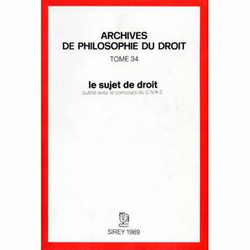
Complete reference : Archives de Philosophie du Droit (APD), Le sujet de droit, tome 34, ed. Sirey, 1989, 430 p.
Read the summaries of the articles in English.
See the presentation of other volumes of Archives de Philosophie du Droit.
Thesaurus : Doctrine
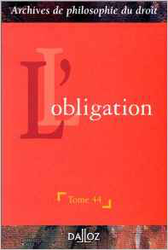
Complete reference : Archives de Philosophie du Droit (APD), L'obligation, tome 44, Dalloz, 2000, 525 p.
Read the summaries of the articles in english.
See the presentation of other volumes of Archives de Philosophie du Droit.
Thesaurus : Doctrine
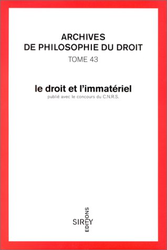
Référence complète : Archives de Philosophie du Droit (APD), Le droit et l'immatériel, tome 43, ed. Sirey, 1999, 521 p.
Lire la quatrième de couverture.
Lire les résumés des articles en langue anglais.
Lire la présentation de l'article de Hélène Ruiz Fabri, Immatériel, territorialité et État.
Voir la présentation d'autres tomes des Archives de Philosophie du Droit.
Thesaurus : Doctrine
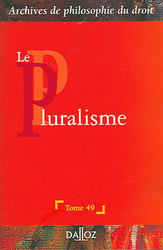
Référence complète : Archives de Philosophie du Droit (APD), Le pluralisme, tome 49, Dalloz, 2006, 499 p.
Read the summaries of the articles in English.
See the presentation of other volumes of Archives de Philosophie du Droit.
Thesaurus : Doctrine
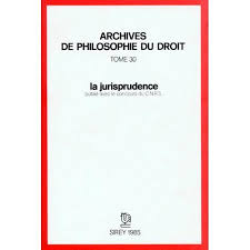
Complete reference : Archives de Philosophie du Droit (APD), La jurisprudence, tome 30, ed. Sirey, 1985, 444 p.
Read the summaries in english.
See the presentation of other articles of Archives de Philosophie du Droit.
Thesaurus : Doctrine

Complete reference : Archives de Philosophie du Droit (APD), Droit et science, tome 36, ed. Sirey, 1991, 418 p.
Read the summaries of the articles in english.
See the presentation of others volumes of Archives de Philosophie du Droit.
Thesaurus : Doctrine
Thesaurus : Doctrine
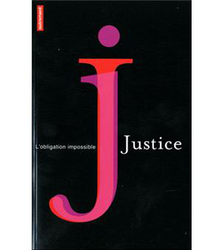
Référence complète : Lebovici, S., C'est pas juste, in Baranès, W. et Frison-Roche, M.-A., La justice. L'obligation impossible, coll. " Nos valeurs", Éditions Autrement, 1994, p. 16-27.
Consulter la présentation générale de l'ouvrage.
Consulter une analyse dans laquelle cet article est cité.
« Les étudiants de Sciences po peuvent lire l’article via le Drive de Sciences po en allant dans le dossier « MAFR – Régulation ».
Thesaurus : Doctrine
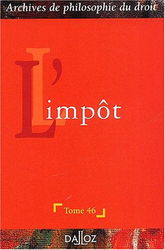
Complete reference : Archives de Philosophie du Droit (APD), L'impôt, tome 46, Dalloz, 2002, 547 p.
Read the summaries of the articles in English.
See the presentation of other volumes of Archives de Philosophie du Droit.
Thesaurus : Doctrine
Thesaurus : Doctrine
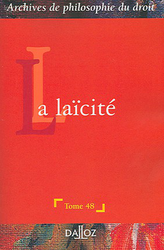
Complete reference : Archives de Philosophie du Droit (APD), La laïcité, tome 48, Dalloz, 2005, 519 p.
Read the summaries of the articles in English.
See the presentation of other volumes of Archives de Philosophie du Droit.
Compliance and Regulation Law bilingual Dictionnary

Legally, the State is a public law subject defined by territory, people and institutions. It acts in the international space and emits norms. Politically, it has the legitimacy required to express the will of the social body and to exercise the violence of which it deprives the other subjects of law. It is often recognizable by its power: its use of public force, its budgetary power, its jurisdictional power. These three powers, declining or being challenged by private, international and more satisfying mechanisms, some predicted the disappearance of the State, to deplore it or to dance on its corpse.
With such a background, in current theories of Regulation, primarily constructed by economic thought and at first sight one might say that the State is above all the enemy. And this for two main reasons. The first is theoretical and of a negative nature. The advocates of the theory of regulation deny the State the political qualities set out above. The State would not be a "person" but rather a group of individuals, civil servants, elected officials and other concrete human beings, expressing nothing but their particular interests, coming into conflict with other interests, and using their powers to serve the former rather than the latter as everyone else. The Regulation theory, adjoining the theory of the agency, is then aimed at controlling public agents and elected representatives in whom there is no reason to trust a priori.
The second reason is practical and positive. The State would not be a "person" but an organization. Here we find the same perspective as for the concept of enterprise, which classical lawyers conceive as a person or a group of people, while economists who conceive of the world through the market represent it as an organization. The state as an organization should be "efficient" or even "optimal". It is then the pragmatic function of the Regulation Law. When it is governed by traditional law, entangled by that it would be an almost religious illusions of the general interest, or even the social contract, it is suboptimal. The Regulation purpose is about making it more effective.
To this end, as an organization, the State is divided into independent regulatory agencies or independent administrative authorities that manage the subjects as close as possible, which is fortunate in reducing the asymmetry of information and in reviving trust in a direct link. The unitary, distant and arrogant State is abandoned for a flexible and pragmatic conception of a strategic state (without capital ...) that would finally have understood that it is an organization like any other ...
Competition law adopts this conception of the State, which it posed from the beginning that it was an economic operator like any other. This is how this conception which would be more "neutral" of the world is often presented.
Successive crises, whether sanitary or financial, have produced a pendulum effect.
Now, the notions of general interest or common goods are credited of an autonomous value, and the necessity of surpassing immediate interests and of finding persons to bear superior interests or to take charge of the interests of others, even a non-immediate one, emerged.
Thus, the State or the public authority, reappears in the globalization. The Compliance Law or the Corporal Social Responsibility of the crucial companies are converging towards a consideration of the State, which can not be reduced to a pure and simple organization receptacle of externalities.
Compliance and Regulation Law bilingual Dictionnary

The goal for which a mechanism, a solution an institution or a rule is adopted, instituted or elaborated, is in principle external to them. Knowledge of this goal is a tool to better understand them and is only that.
On the contrary, in Regulation Law, the goal is the heart itself. By definition, Regulation Law is a set of instruments that articulate to take their meaning in relation to a goal. Moreover, these instruments are legitimate to represent a constraint only because they realize a goal which is itself legitimate. The interpretation of Regulation Law is based on the aims pursued: the reasoning is teleological.
This teleological nature explains that efficiency is no longer merely a concern - as for ordinary legal mechanisms, but rather a principle of Regulation Law. It explains the welcome, especially through the European Union Law of the theory of the useful effect. This link between rules, which are only means, and aims, refers to the principle of proportionality, which requires that constraints and exceptions be applied only when they are necessary, proportionality being the form off the classic principle of necessity.
Because the aim is the center, it must be expressed by the author of the Regulation standards, and this is all the more so if they are of a political nature, being not limited to mitigating technical failures of markets. This goal can be varied: the management of systemic risks, but also the consideration of the fundamental rights of people, the preservation of the environment, public health, civilization, education, etc. The silence of the legislature, which limits itself to the making of rules whereas these are merely instruments, without explicating the goal whereas the latter is a political decision, is a fault in the legislative art.
Moreover, in order that the person who applies the Regulation norm, in particular the Regulator and the Judge, has no excessive margin for interpretation and does not substitute for political power, the author of the Regulation norm needs to aim specifically for one goal : in this way, the one who applies the norm will be constrained. Or, if the author targets several purposes, then he must articulate them in relation to each other, by hierarchizing them for example. If he fails to do so, the institution which applies the regulatory standards will itself have to choose the purpose and exercise a power which he does not possess.
This express designation of purpose has been made for the European Banking Union, this Regulation and Supervision construction, whose primary aim is to prevent systemic risks and resolve crises. Similarly, the purpose of the Regulation of essentiel infrastructures is to provide third parties access to the network. Similarly, in the case of a transitional regulation introduced following liberalization, the aim is to establish competition, the principle of which has been declared by the liberalization law. When this is not clearly stated, there is a lapse in the legislative art.
Compliance and Regulation Law bilingual Dictionnary

The notion of "Common Goods" refers to a political conception insofar as it concerns objectively commercial goods such as cultural goods or medical services, but which the community is going to demand that everyone should have access to it even though the individual does not have the ability to pay the exact price. It is then the taxpayer - present or future - or the social partners who bear the cost, or even some companies, through the corporal social social responsibility mechanism.
This protection of Common Goods can be done by the State in the name of the interest of the social group for which it is responsible and whose it expresses the will, particularly through the notion of the general interest. In this now restricted framework which is the State, this reference runs counter to the principle of competition. This is particularly clear in Europe, which is based on a Union built on an autonomous and integrated legal order in the Member States in which competition continues to have a principled value and benefits from the hierarchy of norms. The evolution of European Law has balanced the principle of competition with other principles, such as the management of systemic risks, for example health, financial or environmental risks and the creation of the banking union shows that the principle of competition is no longer an apex in the European system.
But it still remains to an economic and financial conception of Europe, definition that the definition of the Regulatory Law when it is restricted to the management of the market failures feeds. It is conceivable that Europe will one day evolve towards a more humanistic conception of Regulatory Law, the same one that the European States practice and defend, notably through the notion of public service. Indeed and traditionally, public services give people access to common goods, such as education, health or culture.
Paradoxically, even though Law is not set up on a global scale, it is at this level that the legal notion of "common goods" has developed.
When one refers to goods that are called "global goods", one then seeks goods that are common to humanity, such as oceans or civilizations. It is at once the heart of Nature and the heart of Human Being, which plunges into the past and the future. Paradoxically, the concept of "global goods" is still more political in substance, but because of a lack of global political governance, effective protection is difficult, as their political consecration can only be effective nationally or simply declaratory internationally. That is why this balance is at present only at national level, which refers to the difficulty of regulating globalization.
Thus, the "common goods" legally exist more under their black face: the "global evils" or "global ills" or "global failures", against which a "Global Law" actually takes place. The notion of "global evils" constitutes a sort of mirror of Common Goods. It is then observed that countries that develop legal discourse to regulate global evils and global goods thus deploy global unilateral national Law. This is the case in the United States, notably in financial regulatory Law or more broadly through the new Compliance Law, which is being born. Companies have a role to play, particularly through Codes of Conduct and Corporate Social Responsibility.
Thesaurus : Doctrine
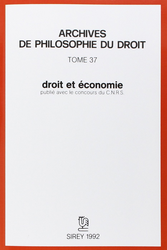
Complete reference : Archives de Philosophie du Droit (APD), Droit et économie, tome 37, ed. Sirey, 1992, 426 p.
Read the summaries of the articles in english.
See the presentation of others volumes of Archives de Philosophie du Droit.
Compliance and Regulation Law bilingual Dictionnary

Le légicentrisme exprime avant tout une bataille de normes, puisque cette doctrine pose que la loi est la seule et unique expression de la souveraineté de la Nation. En cela, la loi dispose d'une autorité indépassable et c'est elle qui fonde l'État légal.
Ainsi, si l'on devait donner une figure au système juridique, ce serait un cercle avec en son cœur d'une façon unique la loi souveraine, à la fois autosuffisante dans son fondement (souveraineté) et dans sa production (principe de légalité).
Cette conception moniste (unité de la loi) a pour principale source la philosophie politique de Jean-Jacques Rousseau, c'est encore sur celui-ci que la France conserve le principe de souveraineté parlementaire (le Gouvernement est responsable devant le Parlement) et de souveraineté de la loi. Mais depuis la Révolution française, les esprits et les faits ont changé.
Ainsi, s'est construite une doctrine inverse : le "pluralisme juridique" qui pose en contradiction que le droit vient de nombreuses sources, comme la coutume, les pratiques, les jugements, etc. Il n'est pas étonnant que les auteurs qui affirment le pluralisme juridique ne viennent pas de la philosophie politique mais davantage de la sociologie comme Gurvitch ou Carbonnier.
En outre, les frontières nationales ont perdu de leur consistance, de fait et de droit. C'est pourquoi un auteur comme Mireille Delmas-Marty s'appuie sur le fait même de la construction de l'Europe des droits de l'homme d'une part et de la globalisation d'autre part pour affirmer que le légicentrisme a fait place à un pluralisme juridique généralisé.
Cependant, en droit positif les textes restent les mêmes. C'est ainsi que l'article 6 de la Déclaration des droits de l'homme et du citoyen de 1789, qui fait partie du bloc de constitutionnalité, dispose de la loi que "la loi est l'expression de la volonté générale".
De la même façon, l'article 5 du Code civil continue d'interdire au juge de rendre des jugements contraignants pour d'autres cas que celui particulier sur lequel il se prononce.
Cette permanence des textes les plus gradés, à savoir l'article 5 du Code civil et l'article 6 de la déclaration pose de nombreux problèmes aux juges. En effet, depuis l'arrêt du Tribunal des conflits Blanco, le droit administratif n'est plus lié par ce qui est posé par le Code civil et sans doute la puissance normative du Conseil d'Etat s'exprime plus ouvertement que celle de la Cour de cassation, qui feint de ne rendre que des arrêts de principe pour pouvoir affirmer qu'elle ne rend pas d'arrêt de règlement.
D'une façon plus complexe, le Conseil constitutionnel rappelle régulièrement que certes il est le gardien de la norme constitutionnelle supérieure à la loi mais quand le même temps, seul le législateur, puisque celui est le souverain, peut exprimer la volonté générale, ce à quoi le Conseil constitutionnel ne peut se substituer.
Mais le Droit de l'Union européenne, qui constitue un Ordre juridique à la fois autonome et dont les normes sont pourtant intégrées dans les ordres juridiques des Etats-membres, rend difficilement soutenable la conception du légicentrisme. Y a succédée une hiérarchie des normes complexes. Mais les fondements politiques de l'idée de légicentrisme alimente en grande partie l'hostilité à l'égard de l'Europe, aussi bien celle de l'Union que celle de la CEDH.
Thesaurus : Doctrine

Référence complète Fox, E., The new world order, in Mélanges Joël Monéger, Liber Amicorum en l'honneur du Professeur Joël Monéger, LexisNexis, 2017, 818 p.
Thesaurus : Doctrine
Référence complète : Gibert, M., Faire la morale aux robots. Une introduction à l'éthique des algorithmes, Flammarion, 2021, 168 p.
Thesaurus : Doctrine
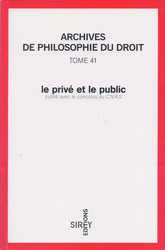
Complete reference : Archives de Philosophie du Droit (APD), Le privé et le public, tome 41, ed. Sirey, 1997, 585 p.
Read the summaries of the articles in english.
See the presentation of other volumes from the Archives of Philosophy of Law.
Thesaurus : Doctrine
► Référence complète : O. Jouanjan, "L’Ecole historique du Droit en Allemagne : entre histoire et philosophie du droit", Université de Poitiers", conférence du 8 février 2023
____
Thesaurus : Doctrine

Complete reference : Archives de Philosophie du Droit (APD), La philosophie du droit aujourd'hui, tome 33, ed. Sirey, 1988, 467 p.
Read the summaries of the articles in English.
See the presentation of other volumes of Archives de Philosophie du Droit.